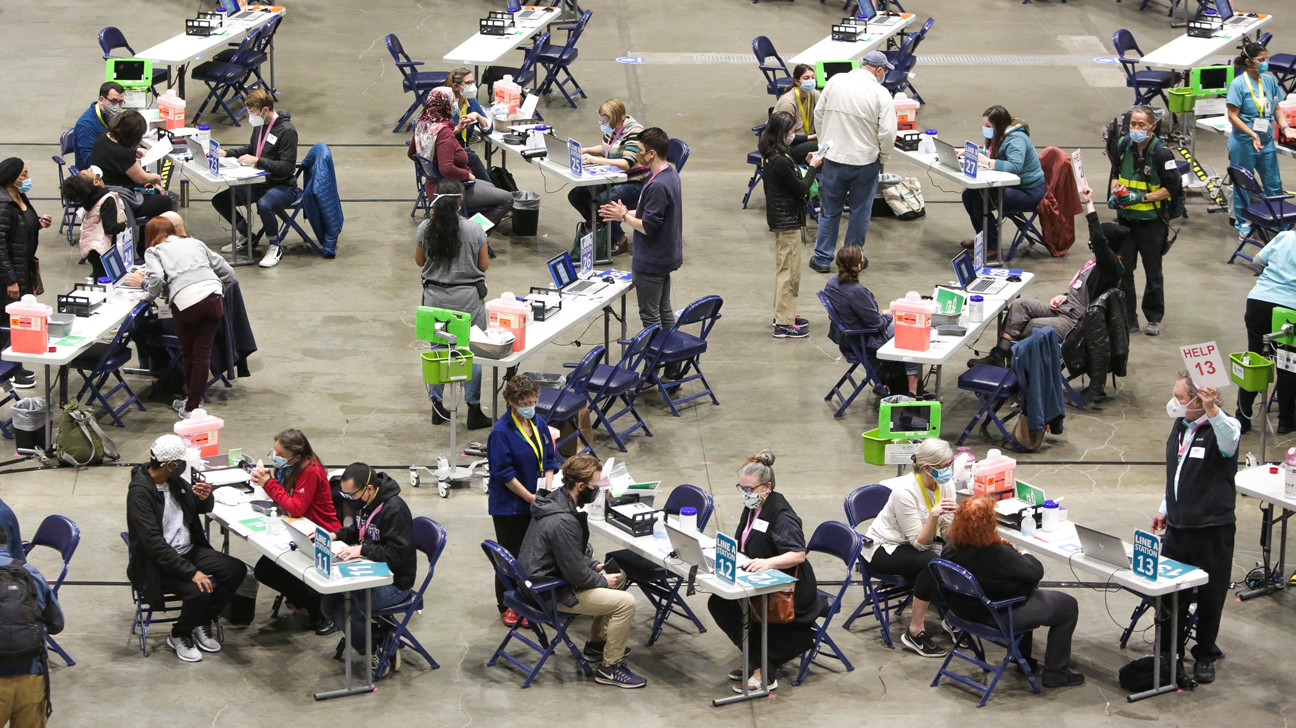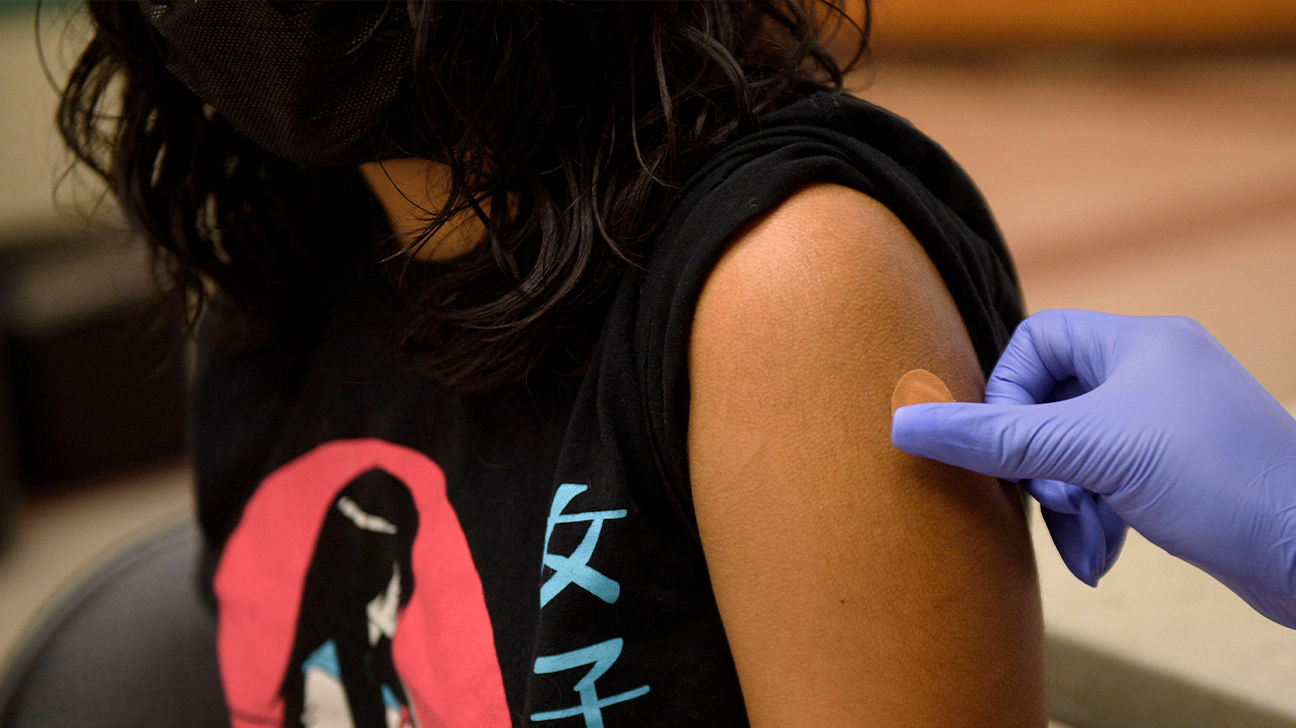People are out and about again as the COVID-19 pandemic fades into a more endemic stage. Ed Jones/AFP via Getty Images
The daily rate of new COVID-19 cases in the United States has hovered at about 30,000 for the past month.
Hospitalizations for COVID-19 remain at about 12,000 across the nation, a fraction of what they were during the height of the Omicron surge earlier this year.
The death toll for COVID-19 has continued to slowly decline, although it remains at more than 500 per day.
The daily vaccination rate has climbed back to more than 500,000, a figure that might be considered encouraging even though it is significantly less than the more than 3 million daily vaccinations administered a year ago.
Nonetheless, the future of the COVID-19 pandemic remains a bit uncertain.
There are new concerns over a rise in cases in some regions of the country as new subvariants of the novel coronavirus circulate and safety protocols are loosened.
There are also questions about the effectiveness of a 4th dose of COVID-19 vaccine.
Then, there’s the specter of long COVID and how pervasive this condition will be for people who have recovered from COVID-19 but can’t shake the symptoms.
With all this in mind, we asked three infectious disease experts for their perspectives on the current status of the COVID-19 pandemic.
Dr. Monica Gandhi is a professor of medicine at the University of California San Francisco.
Dr. William Schaffner is a professor of infectious diseases at Vanderbilt University in Tennessee.
Dr. Jamila Taylor is the director of healthcare reform and a senior fellow at The Century Foundation.
Here’s what they had to say.
Healthline: Do you think there will be a significant rise in COVID-19 cases and hospitalizations this summer or fall?
Gandhi: SARS-CoV-2 cannot be eliminated or eradicated due to four different reasons: 1) 29 different species of animals have been identified that carry the virus and they can serve as zoonotic reservoirs to humans; 2) COVID-19 symptoms can resemble those of other respiratory pathogens, making it difficult to isolate just those with COVID-19; 3) The virus has a relatively long infectious period compared to a virus like smallpox which was eradicated; 4) Our vaccines are excellent at preventing severe disease but are increasingly non-sterilizing with time since vaccination and with the emerging variants.
Therefore, I think this will become a seasonal respiratory virus and we are likely to see increases in cases in the fall and winter when we see increases in other respiratory pathogens due to more time spent indoors. We have highly effective vaccines and therapeutics so we will hopefully not see a significant rise in hospitalizations with this rise in cases, however.
Those who are medically vulnerable (e.g. immunocompromised, older patients) should get a fourth shot or second booster if we see cases start to rise in the fall and should be prioritized for outpatient antiviral treatment if they get infected to prevent progression to severe disease.
Schaffner: Our current dominant variant, BA.2, is very contagious and is able to infect even vaccinated people, so I anticipate that there may well be a surge of mild infections over the summer and into the fall.
Fortunately, our current vaccines continue to provide rather solid protection against serious illness, so hospitalizations and deaths are not likely to increase to a comparable degree.
I am concerned that there still are many persons who are unvaccinated and even more who have not yet received a third dose (the first booster). Such persons remain vulnerable to more serious infections and could produce local increases in hospitalizations.
Taylor: I think as we head into the summer months, and with increased travel, we will see increases in cases. We have been at this for 3 years now. We know the patterns.
As the protocol on boosters continues to develop, I am hoping that more people will become vaccinated/boosted, which is keeping people out of the hospital due to serious illness from COVID-19.
 Vaccinations are still considered the best way to avoid serious illness from COVID-19. Jason Redmond/AFP via Getty Images
Vaccinations are still considered the best way to avoid serious illness from COVID-19. Jason Redmond/AFP via Getty Images
Healthline: If there is an increase, do you think people should be overly concerned if family and friends test positive, or should they focus more on if anyone is becoming seriously ill?
Gandhi: Because COVID-19 cannot be eradicated, I think we need to shift our focus to preventing severe disease by both vaccinations of our population, deciding who needs booster shots when we see cases rise, prioritizing Evusheld or prophylactic monoclonal antibodies for the immunocompromised, and providing those at high risk to severe disease after being infected with oral antiviral treatments (right now, molnupiravir and Paxlovid) after testing.
If we use COVID-19 hospitalizations as our marker of COVID success now with an endemic virus (hospitalizations for COVID instead of with COVID), people should not be concerned if family, friends, and others may test positive since cases and hospitalizations become decoupled at high levels of immunity.
Moreover, in terms of long COVID symptoms, a well-controlled study from Israel shows us that those with breakthrough infections after 1 or 2 doses of the COVID-19 vaccine report much fewer long COVID symptoms than the unvaccinated. In fact, those with a breakthrough infection report no more long COVID symptoms than those who were uninfected, suggesting vaccination brings these symptoms back to baseline.
Therefore, as COVID-19 becomes endemic, we should not be concerned about mild infections with SARS-CoV-2 moving forward.
Schaffner: The important focus is on who you and your family and friends are. Are you/they in a high risk group for severe disease? Are you/they older than 65, frail, have an underlying chronic illness (heart or lung disease, diabetes), or are you/they medically obese or immunocompromised? Are you a person who is caring for someone with these characteristics?
If so, continue to be careful, be alert for symptoms, get tested promptly if symptoms arise and, if positive, contact your provider to check whether you are eligible for the new antiviral agents that can help avert progression to more severe disease.
If family, friends, and others are testing positive that is clear evidence that they are “out and about” and are no longer social distancing. You ought to be concerned if you are unvaccinated or incompletely vaccinated or if you are in a high risk group for severe disease.
Taylor: People should begin to view it as something we may be living with as a society. Everyone should take precautions to mitigate, keeping up with vaccines and boosters, wearing masks in crowded indoor spaces, and practicing good hygiene.
We are still in a situation where it will take all of us to keep each other safe. We are in this together. If family, friends, and others are testing positive, vaccines should still keep them from becoming seriously ill and ending up in the hospital.
 COVID-19 vaccinations have increased to more than 500,000 per day. Patrick T. Fallon/AFP via Getty Images
COVID-19 vaccinations have increased to more than 500,000 per day. Patrick T. Fallon/AFP via Getty Images
Healthline: What are your thoughts on a 4th COVID shot? Are they necessary at this point and, if so, who should get them?
Gandhi: For 4th shots, the European equivalent of the CDC has recommended these for individuals 80 years and older at this time, citing that they do not see evidence for those 60-79 years old requiring a second booster at this stage of the pandemic.
I think the US FDA/CDC decision to provide fourth shots for those 50 and older was premature and that we should probably recommend these for the population Pfizer asked the FDA for, which is those over 65 years of age and older.
A recent study in the New England Journal of Medicine didn’t show a benefit for the 4th dose for healthcare workers who were younger than 65 in terms of vaccine effectiveness nor decreasing viral loads (e.g. infectiousness). Therefore, I do not see a broad indication for younger people getting the 4th COVID shot at this time.
Schaffner: The benefits of the 4th COVID shot (second booster) are focused on persons who are older than age 50 and are in high risk groups: those older than 65 (the older, the greater the risk), those with underlying medical conditions (heart or lung disease, diabetes, obesity), those who are immunocompromised, or who are close caring for such persons.
Taylor: A 4th shot may be necessary. In fact, we may see a similar regime seasonally or yearly as we see with other vaccinations such as the flu shot. If that is what it will take to keep each other safe, particularly for the elderly, young people, and the immunocompromised, we should all be adhering to this.


